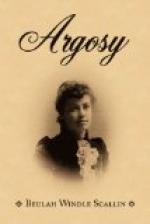I think of Catherine and Annie, and I remark that the breakwaters are formed of hop-poles, twined together and clasped with red-rusted iron girdles; the wood has been washed by the tides white and clean as bones. I wonder whether I shall ask Annie to be my wife, and I wonder also whence came those—literally—millions of wine bottle corks that strew the beach to my right. From a wreck? from old fishing nets? or merely from the natural consumption of beer at the building of the breakwater?
Coming back to Down End, I find a travelling threshing machine at work in the rick-yard. I had heard the monotonous thrumming of its wheels a good way off. The scene is one of great animation, the machine is drawn up against the conical-shaped haystack, its black smoke stretches out in serpentine coils against the sky. A dozen men are busy about her: those who work her, old Anderson, son Robert—a dreadful lout he is too, quite unlike his sister—various other louts of the same calibre, the two little boys, very much in everyone’s way, and Mrs. Anderson and Annie, who have just brought out jugs of ale. I naturally stop to say a few words to Annie and watch the threshing. Anderson is grinding out some of last year’s oats for the cattle.
Son Robert comes to take a pull out of Annie’s jug. “That’s prime, measter, ain’t it?” he says to me, and wipes his mouth with the back of his hand. I go in thoughtfully. Is son Robert exactly the sort of man I should care to call brother-in-law?
April 11, 12.—These two days I have been casting up the pros and cons of a marriage with Annie. Shall it be—or not be? I suffer from a Hamlet-like perplexity. On the one hand I get a good, an amiable, an adoring little wife, who would forestall my slightest wish, who would warm my slippers for me, for whom I should be the Alpha and Omega of existence. She would never argue with me, never contradict me, never dream of laughing at me; would never laugh at all unless I allowed her, for she would give into my keeping, as a good wife should, the key of her smiles and of her tears. But of course I should wish her to laugh. I should wish the dear little creature to remain as merry and thoughtless as possible. Dear Annie! what surprise and delight will shine in your innocent blue eyes when I tell you my story! Your childlike gratitude will be almost embarrassing. Last, and perhaps most weighty pro of all—when Catherine hears of it she will be filled with regret; yes, she may act indifference as gaily as she pleases, I am convinced that in her heart of hearts she will be sorry.




